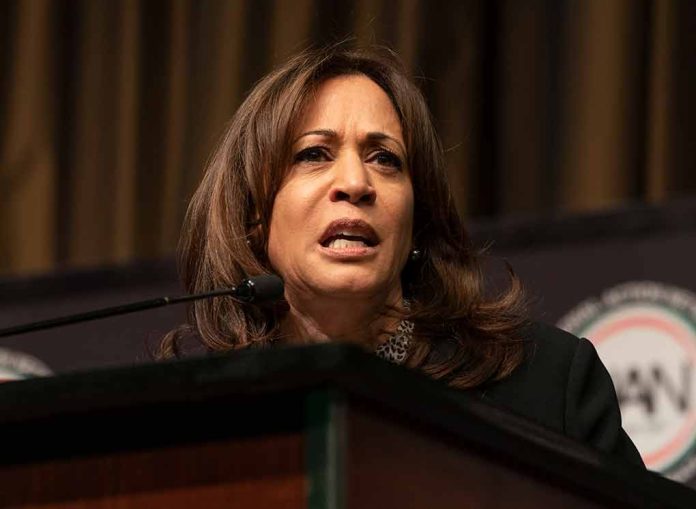
Vice President Kamala Harris unveils a bold campaign strategy, promising marijuana legalization to secure young male votes and address social injustices.
At a Glance
- Harris advocates for federal marijuana legalization as a key campaign promise.
- The strategy aims to attract young voters, particularly Black men.
- Cannabis reform is framed as a social justice issue to rectify systemic inequalities.
- Harris’s campaign aligns itself with the adult entertainment industry in opposition to Republican policies.
- Economic proposals include housing initiatives and support for Black entrepreneurs.
Harris’s Cannabis Legalization Platform
Vice President Kamala Harris is making waves in her campaign by prominently featuring marijuana legalization as a cornerstone policy. This strategic move is designed to appeal to young male voters, particularly within the Black community. Harris has been vocal about the need to end the criminalization of marijuana use, emphasizing its importance for children’s health and social justice.
Conservative Americans may view this as a contentious approach, especially given concerns over the societal costs of drug legalization.
During an appearance on the “All the Smoke” podcast, Harris articulated her stance clearly: “I just think we have come to a point where we have to understand that we need to legalize it and stop criminalizing this behavior. The most important thing is that our kids grow up healthy.”
This statement has sparked debate over whether marijuana legalization aligns with the goal of a healthy future for American children and families.
Social Justice and Equity in Cannabis Reform
Harris’s campaign is not just about legalizing marijuana; it’s about addressing the systemic injustices that have disproportionately affected communities of color. The Vice President has highlighted the stark disparities in marijuana-related arrests, noting that Black individuals are four times more likely to be arrested for such offenses than their white counterparts.
Many conservatives may agree on the need for fair treatment under the law but remain wary of how broad legalization will address deeper social challenges. For those who prioritize law and order, this acknowledgment of historical injustices may still leave unanswered questions about how legalization will impact crime rates and community stability.
YOU LIE @KamalaHarris!!! Federal Marijuana laws are exactly the same as they were in 2020 and worse, NOT ONE CANNABIS PRISONER HAS BEEN RELEASED. To boot, MANY HAVE BEEN IMPRISONED since @POTUS and you took office. SHAME ON YOU!!! #MissionGreen @weldon_angelos @GlassHouseBR https://t.co/ZnsQpAiFv6
— Kyle Kazan (@kylekazanceo) February 10, 2024
Economic Proposals and Support for Black Entrepreneurs
Harris’s campaign extends beyond cannabis reform, encompassing a range of economic proposals aimed at building an “opportunity economy.” These include plans to construct 3 million new housing units, offer $25,000 for first-time homebuyers, raise the minimum wage, and support small businesses.
Conservatives, while supportive of entrepreneurship, might argue that government spending programs can lead to higher taxes and debt, straining the economy.
Notably, Harris has introduced a specific policy plan for Black men, which includes forgivable loans for entrepreneurs and a National Health Equity Initiative. The campaign states it “will break down unjust legal barriers that hold Black men and other Americans back by legalizing marijuana nationally, working with Congress to ensure that the safe cultivation, distribution, and possession of recreational marijuana is the law of the land.”
Many Americans question whether government loans and legal reforms alone will deliver the desired economic stability or if they might add to government overreach.
Challenges and Criticisms
While Harris’s campaign strategy has garnered support from various quarters, including the adult entertainment industry, it has also faced criticism. Some conservatives argue that the focus on marijuana legalization and alignment with the porn industry could contribute to social issues. For family-oriented conservatives, such alliances raise concerns about the cultural message being promoted and the impact on American values.
“I think the combination of porn, abortion have basically created a lonely, isolated generation that isn’t getting married, they’re not having families, and they’re actually not even totally sure how to interact with each other,” said JD Vance in an interview with Crisis Magazine.
Additionally, Harris’s stance on immigration, which includes offering a supply of young migrants to replace American workers, has drawn criticism from some economists who link it to increased inequality. For conservatives, this stance is particularly concerning, as they argue that prioritizing American workers is essential for protecting the nation’s economic security and opportunities.
Public Opinion and Future Prospects
While support for marijuana legalization has grown, the concerns many Americans hold about the broader impacts remain significant. A Gallup poll shows that 70% of Americans favor full legalization, yet conservative Americans recognize that popularity does not always equate to what is best for society’s long-term well-being. Questions linger about the potential consequences for public health, addiction rates, and the stability of family structures—values that have always been at the core of American strength.
As the campaign unfolds, Harris’s focus on marijuana legalization and social justice may appeal to some demographics, but many are questioning whether these policies truly address the real challenges facing American communities. Conservatives are particularly mindful of the deeper societal impacts that come with normalizing marijuana use. This intersection of drug policy, economic strategies, and social reform raises important questions about America’s future—questions that touch on cultural integrity, economic resilience, and the foundational stability of family and community values.








